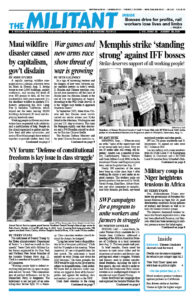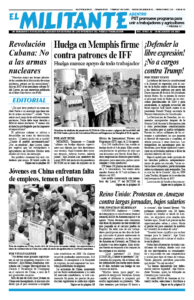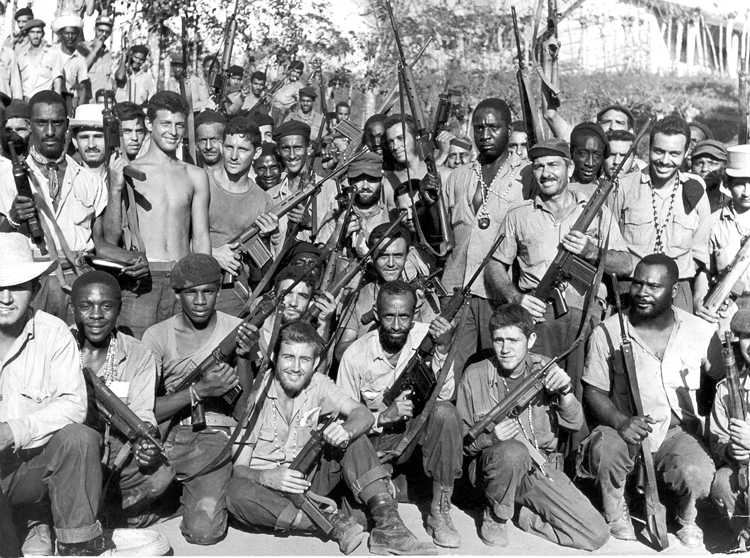Cuba and the Coming American Revolution by Jack Barnes, national secretary of the Socialist Workers Party, is one of Pathfinder’s Books of the Month for August. The excerpt is from the chapter “There will be a victorious revolution in the United States before a victorious counterrevolution in Cuba,” based on talks by Barnes in March 2001. Cuba’s workers and farmers crushed the U.S.-backed mercenary assault at Playa Girón in less than 72 hours. It was U.S. imperialism’s first military defeat in the Americas. On the eve of the battle, Fidel Castro told the world they had made a socialist revolution. Copyright © 2007 by Pathfinder Press. Reprinted by permission.
The U.S. rulers were wrong about the workers and farmers of Cuba. Officials in the CIA and White House expected the invasion force, after a few days, to spark some uprisings against the revolutionary government. They anticipated some divisions among the officers of Cuba’s revolutionary armed forces, too. By analogy, the imperialists saw the government in Cuba as some tropical variety of a Stalinist regime, with the same inherent brittleness. And they saw the cadres of the Revolutionary Armed Forces as some radical variant of a bourgeois Latin American officer corps, comparable to those they had long dealt with. …
The battle wasn’t bungled by the operations section of the CIA; it was won by the workers and farmers of revolutionary Cuba. What led to the outcome wasn’t the military inadequacy of the imperialist rulers, something they could conceivably — and rapidly — improve; it was their class political blindness, something they cannot change. And this blindness extended all the way from the White House, to the CIA, to the liberal opinion molders, to the leadership of the mercenary brigade itself. …
[A] March 13, 1961, speech by Fidel Castro, [was] given as Washington was accelerating its campaign of terror aimed at overturning the Cuban Revolution. …
There is one thing the Cuban people “can tell Mr. Kennedy,” Castro said to the cheering crowd. “A victorious revolution will be seen in the United States before a victorious counterrevolution in Cuba.”
We’re convinced that sentence remains as accurate today as it was in 1961. It’s not a prediction; it’s not an encouraging clap on the back. It’s the recognition of how capitalism works, of the line of march of working people, and of the communist caliber of the revolutionary movement in Cuba. For revolutionists in the United States, in Cuba, and around the world, it sharply poses Lenin’s famous question: What is to be done?
Fidel’s assertion makes quite a statement about the Cuban Revolution — even more so forty years later, if you think about it, than it did at the time. And it was quite a statement in 1961! …
We should recall that only a matter of days after their defeat at Playa Girón, the Kennedy administration began making plans for an invasion force of tens of thousands of soldiers to assault Cuba. The invasion was to be the culmination of a stepped-up program of covert air and sea attacks, terrorist activity, economic sabotage — and assassinations. By the end of 1961 these plans had been formalized as Operation Mongoose, with Brigadier General Edward Lansdale formally in charge. But this time around the operation was organized directly out of the White House under the supervision of the president’s brother Robert F. Kennedy, who was attorney general. …
One of the recently declassified Mongoose “memorandums for the record” recounts a March 1962 meeting in the Oval Office to discuss a proposed plan to assassinate Fidel Castro during a visit to Ernest Hemingway’s former home near Havana. The memo, drafted by Lansdale, reported “agreement that the matter was so delicate and sensitive that it shouldn’t be surfaced to the Special Group” — the joint CIA-Pentagon-White House body chaired by Robert Kennedy that oversaw Mongoose — “until we were ready to go, and then not in detail. I pointed out that this all pertained to fractioning the regime” — a code word for assassination.
“If it happened,” the memo concluded, “it could develop like a brushfire, much as in Hungary, and we must be prepared to help it win our goal of Cuba freed of a Communist government.”
It’s the memo’s reference to Hungary that I want to call to your attention. Lansdale was drawing an analogy to the Hungarian Revolution of October 1956. Armed workers had risen up against the brutal Stalinist regime and established revolutionary councils in Hungary that year, before being crushed by Soviet tanks a few weeks later.
But this Operation Mongoose memorandum is another example of the U.S. rulers being taken in by their own ideology. Because the socialist revolution in Cuba is not some variant of a Stalinist regime — one with broader popular support to begin with, perhaps, but nonetheless fundamentally alien to the toilers. To the contrary, the revolutionary government in Cuba — a workers and peasants regime, the dictatorship of the proletariat — is the opposite of the regimes of a privileged, petty-bourgeois caste in Hungary, the Soviet Union, China, Vietnam, or anywhere else. Just as Stalinism itself is not a degenerate form of Bolshevism but its negation — a counterrevolutionary current that emerged and crystallized in deadly opposition to the continuity of Lenin’s course and its proletarian internationalist foundations.
As proven at Playa Girón, and then once again a year and a half later in October 1962, the workers and peasants of Cuba weren’t biding their time, waiting for some external shock in order to rise up and overthrow a hated pseudo-socialist government. Instead, on both occasions they mobilized in the millions to defend their national sovereignty, their socialist revolution, and its revolutionary leadership.
Fidel Castro has referred to the collapse of the puffed-up regimes in the Soviet Union and Eastern Europe as “the fall of the meringue.” There was no meringue in Cuba, at the opening of the 1960s. Nor is there one today.


